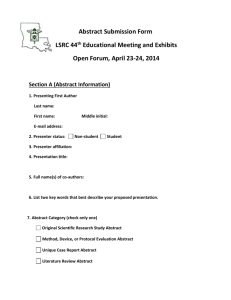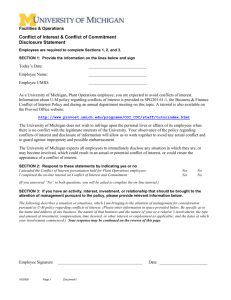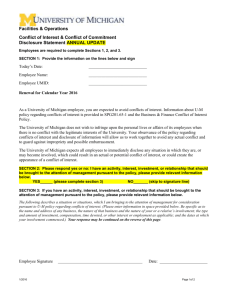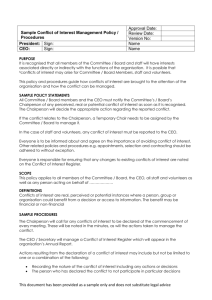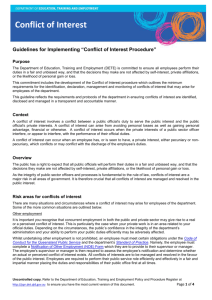Conflict of interest policy / procedure
advertisement
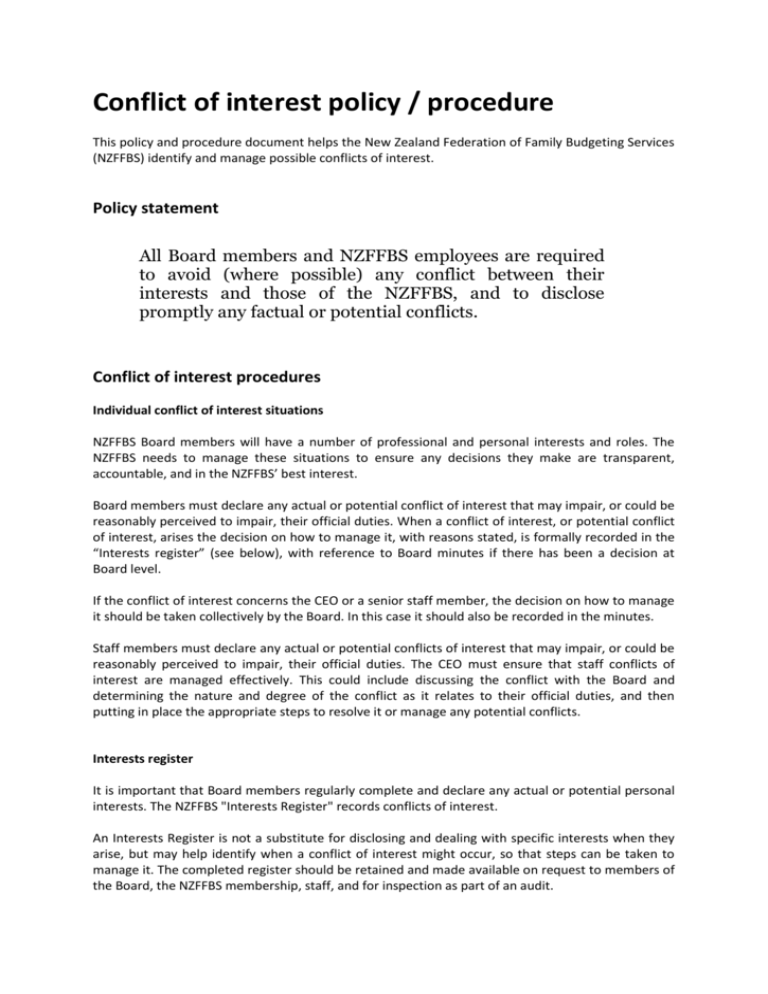
Conflict of interest policy / procedure This policy and procedure document helps the New Zealand Federation of Family Budgeting Services (NZFFBS) identify and manage possible conflicts of interest. Policy statement All Board members and NZFFBS employees are required to avoid (where possible) any conflict between their interests and those of the NZFFBS, and to disclose promptly any factual or potential conflicts. Conflict of interest procedures Individual conflict of interest situations NZFFBS Board members will have a number of professional and personal interests and roles. The NZFFBS needs to manage these situations to ensure any decisions they make are transparent, accountable, and in the NZFFBS’ best interest. Board members must declare any actual or potential conflict of interest that may impair, or could be reasonably perceived to impair, their official duties. When a conflict of interest, or potential conflict of interest, arises the decision on how to manage it, with reasons stated, is formally recorded in the “Interests register” (see below), with reference to Board minutes if there has been a decision at Board level. If the conflict of interest concerns the CEO or a senior staff member, the decision on how to manage it should be taken collectively by the Board. In this case it should also be recorded in the minutes. Staff members must declare any actual or potential conflicts of interest that may impair, or could be reasonably perceived to impair, their official duties. The CEO must ensure that staff conflicts of interest are managed effectively. This could include discussing the conflict with the Board and determining the nature and degree of the conflict as it relates to their official duties, and then putting in place the appropriate steps to resolve it or manage any potential conflicts. Interests register It is important that Board members regularly complete and declare any actual or potential personal interests. The NZFFBS "Interests Register" records conflicts of interest. An Interests Register is not a substitute for disclosing and dealing with specific interests when they arise, but may help identify when a conflict of interest might occur, so that steps can be taken to manage it. The completed register should be retained and made available on request to members of the Board, the NZFFBS membership, staff, and for inspection as part of an audit. Deciding on further action The primary obligation to determine the appropriate next steps lies with the National Board. There may be scope for a range of options and the exercise of discretionary judgement. In these cases, the Board needs to assess carefully: the seriousness of the conflict of interest; and the range of possible options to reduce, or manage, that risk. The assessment is not primarily about the risk that an incident will occur. It is about the seriousness of the connection between the interests, the risk that the Board’s capacity to make decisions neutrally, lawfully and fairly may be compromised, and the risk that the Board’s, NZFFBS’ or the individual's reputation may be damaged. In making this assessment, the Board needs to consider how the situation may reasonably appear to an outside observer. Usually, managing conflicts of interest at the Board level means that the Board member withdraws, or is excluded, from involvement in the Board’s work on the particular matter. In the interests of openness and fairness (and to minimise the risk of the NZFFBS having to defend itself against an allegation of impropriety), it is always safer to err on the side of caution. If the potential conflict of interest involves a Board member and a matter arises at a formal meeting, the member should declare to the meeting that they have an interest in the matter as soon as it is introduced to the meeting, before any discussion takes place. They may then be asked to leave the meeting, or to refrain from voting on that particular issue. Alternatively, the Board may decide that there are adequate processes in place to ensure that the Board’s decision-making is not compromised, and continue with the member’s participation. This will depend on the circumstances, including the financial and ‘political’ implications of the issue being discussed. In other situations, the matter should be raised and discussed with the Board chair as soon as the potential conflict of interest is identified. Managing conflicts of interest at the management level usually means that the staff member is asked to prioritise their work for the NZFFBS over other interests. Where this is not possible, the CEO takes steps to ensure the staff member does not make decisions in any related work areas, to avoid the allegations of impropriety. In these situations the CEO will usually take the appropriate steps and notify the Board at the next meeting. Document1 Page 2 of 2


